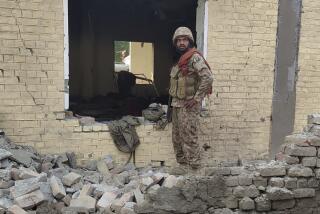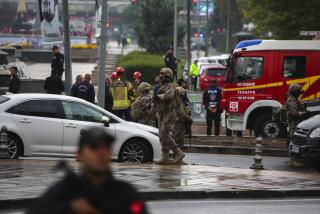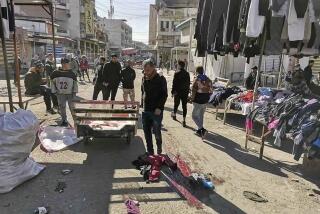Bomber Kills 40 in Baghdad
- Share via
BAGHDAD — A suicide bomber aiming to blow up an Iraqi police station killed 40 people Sunday when his explosives-laden truck detonated as he maneuvered across a highway median in east Baghdad, the U.S. military said.
Some of the victims were incinerated in their cars by the blast, which U.S. military officials estimated had the force of nearly 500 pounds of TNT. The explosion destroyed 18 vehicles, a line of shops and a house. U.S. troops and Iraqi police rushed to the scene of the bombing in a poor neighborhood that is home mainly to Shiite Muslims.
The bombing, the fourth major blast in two weeks, occurred as the transitional National Assembly continued to struggle with the fallout from last week’s assassination of a Sunni Arab member of the constitution-writing committee.
Sunni Arabs have suspended their participation in the drafting until new security measures are in place, and some influential lawmakers now say the document may not be done by the Aug. 15 deadline.
“They may not be able to meet the deadline and get the final draft
“This has happened before. The formation of the government drifted for three months, and the first meeting of the National Assembly took another month.”
However, Shahristani said the assembly would refrain from formally delaying the process, because the slippage is expected to be brief and there is pressure from many quarters to complete the job. Among those urging the assembly to finish on time is Grand Ayatollah Ali Sistani, Iraq’s senior Shiite cleric and a key backer of the United Iraqi Alliance.
“He strongly advises that people keep to the deadline,” Shahristani said.
In addition to creating practical problems such as the Sunnis’ temporary withdrawal from the constitutional committee, Iraq’s ongoing violence has led to less tangible political difficulties.
The insurgents’ campaign of bombings, shootings and abductions has diminished Iraqis’ confidence in the government’s ability to control the situation, and politicians feel increasingly loath to make compromises, lest constituents perceive them as weak.
In light of the latest attacks, Prime Minister Ibrahim Jafari announced a new security program Sunday to more aggressively target the insurgency outside Baghdad.
The plan envisions extending measures employed in Operation Lightning, a crackdown against insurgents in the capital, to other cities. However, despite the deployment of tens of thousands of police and national guard troops, hundreds of arrests and many new checkpoints, the effort appears to have had little effect on the insurgency.
On July 10, a suicide bomber detonated his explosives belt among a group of military recruits in Baghdad, killing at least 21 people. On July 13, an explosives-filled sport utility vehicle blew up in the capital and killed at least 27 Iraqis, most of them children, and a U.S. soldier.
Three days later, a man with a bomb strapped to his waist blew himself up next to a loaded fuel tanker in the town of Musayyib south of Baghdad, incinerating people and buildings and killing more than 90.
Sunday’s bombing was one more example of the random slaughter that has become routine in Iraq. The blast occurred about 75 yards from the Al Rashad police station, spreading trauma across the neighborhood. Dazed residents, many bleeding from cuts caused by flying glass and metal, wandered about.
Taxi driver Izalden Abdul Qader, 53, had just finished his shift and arrived home. Recently, he had fenced off his yard to prevent cars loaded with bombs from parking there. He had been home all of five minutes, he said, “when I heard a loud explosion shattering all the windows in my house and injuring every member of my family.”
“Our injuries are minor, but the house was damaged. The victims are so many. Some were pulled from their cars,” he added with a shudder. His own car, which was his livelihood, was destroyed in the blast.
“Is there any compensation? Who will compensate me?” he asked, sounding confused and at a loss to find someone to blame.
Raid Kamil, 42, a restaurant worker, hurried along the street shortly after the bomb exploded, carrying a large plastic bag stained with blood.
When he heard about the blast, he had rushed to the neighborhood to check on his sister. She was fine, but the explosion’s force had flung body parts all over her yard.
“I found human flesh, human intestines, bones and a skull in her garden and on her balcony, so I gathered it in this bag and I’m taking it to the police,” he said.
Also Sunday, a man was killed when a mortar shell exploded near the Ministry of Interior building, and at least two police officers were reportedly killed in other attacks.
North of Baghdad, a U.S. soldier was killed and two were wounded by indirect fire on a base near Balad, the military said. The U.S. also said a Marine was killed Saturday by an improvised bomb near Rutbah in western Iraq.
Early today, a car bomber struck near the Al Sadir hotel in downtown Baghdad, killing six security guards, according to early police reports.
More to Read
Sign up for Essential California
The most important California stories and recommendations in your inbox every morning.
You may occasionally receive promotional content from the Los Angeles Times.













